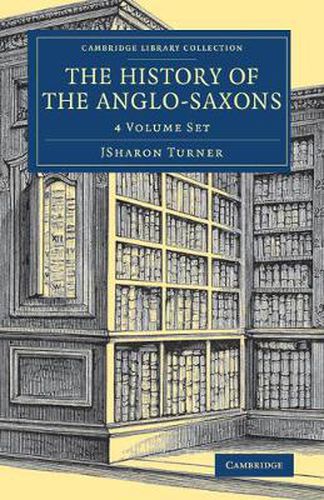Readings Newsletter
Become a Readings Member to make your shopping experience even easier.
Sign in or sign up for free!
You’re not far away from qualifying for FREE standard shipping within Australia
You’ve qualified for FREE standard shipping within Australia
The cart is loading…






Sharon Turner (1768-1847) practised as a solicitor in London, specialising in the law of copyright. As a young man he became enthusiastically involved in the study of Anglo-Saxon and Icelandic literature and history. In 1799-1805 he published this four-volume history, still acknowledged as a turning point in Anglo-Saxon studies and a benchmark in historiography. Turner was elected a fellow of the Society of Antiquaries in 1800, soon after the first volume appeared. His approach of contrasting ‘Anglo-Saxon freedom’ with ‘the Norman yoke’ (an idea dating from the seventeenth century) held particular appeal at a time of deteriorating political relations with France. Turner’s lasting achievement, however, was to draw public attention to the rich and fascinating material contained in the Anglo-Saxon manuscripts he had studied at the British Museum. This work went through many editions, but was eventually superseded by Kemble’s The Saxons in England (1849, also reissued).
$9.00 standard shipping within Australia
FREE standard shipping within Australia for orders over $100.00
Express & International shipping calculated at checkout
Sharon Turner (1768-1847) practised as a solicitor in London, specialising in the law of copyright. As a young man he became enthusiastically involved in the study of Anglo-Saxon and Icelandic literature and history. In 1799-1805 he published this four-volume history, still acknowledged as a turning point in Anglo-Saxon studies and a benchmark in historiography. Turner was elected a fellow of the Society of Antiquaries in 1800, soon after the first volume appeared. His approach of contrasting ‘Anglo-Saxon freedom’ with ‘the Norman yoke’ (an idea dating from the seventeenth century) held particular appeal at a time of deteriorating political relations with France. Turner’s lasting achievement, however, was to draw public attention to the rich and fascinating material contained in the Anglo-Saxon manuscripts he had studied at the British Museum. This work went through many editions, but was eventually superseded by Kemble’s The Saxons in England (1849, also reissued).